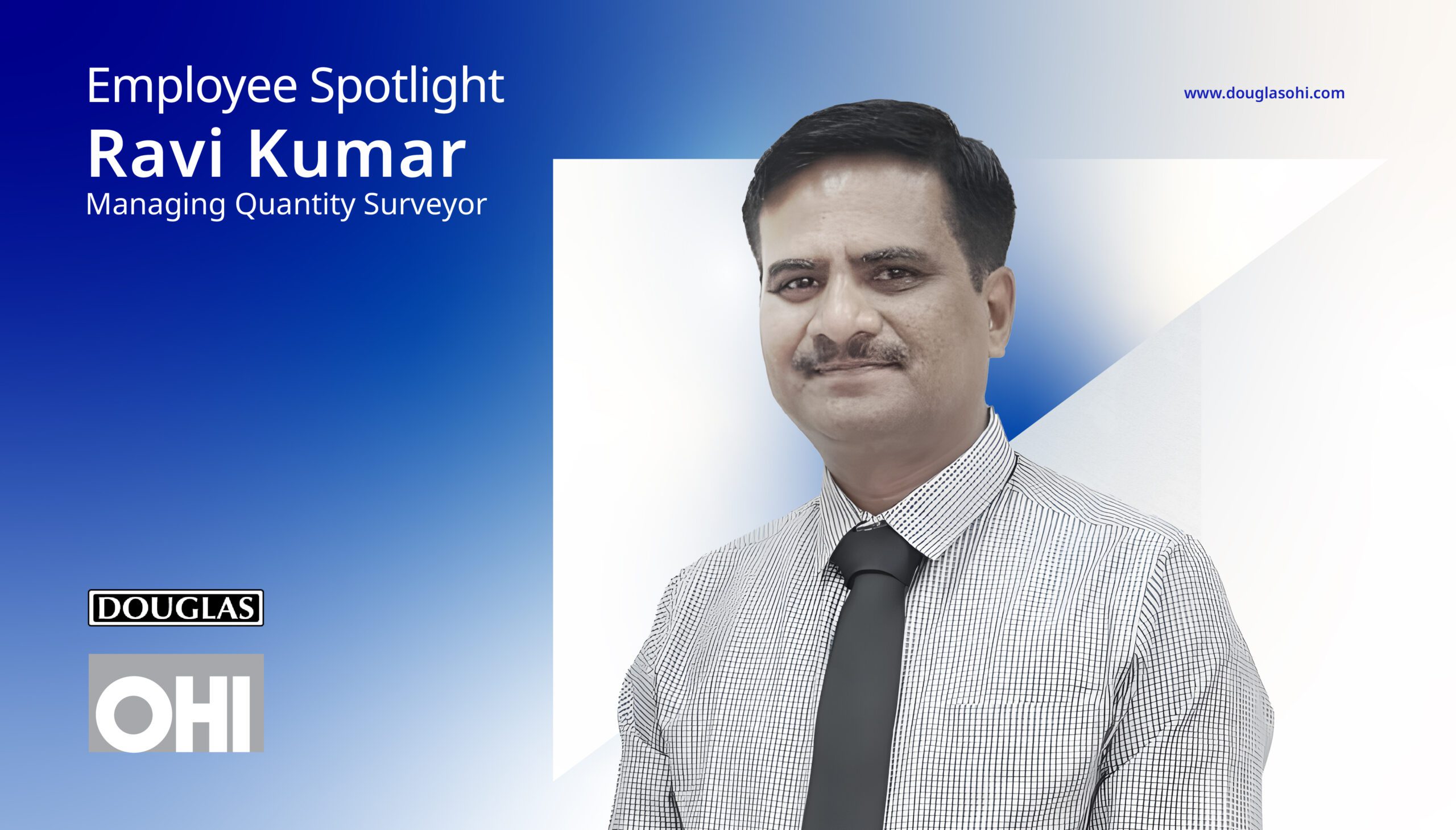
Employee Spotlight | Valsa Kumar Unniyattil Project Manager at Douglas OHI
December 28, 2023
Employee Spotlight | Sanjay Sharma, Factory Manager at Douglas OHI
April 22, 2024- Building Construction Companies in Oman
- Civil Engineering Companies in Oman
- Civil Engineering Consultants In Oman
- construction companies in oman
- construction companies oman
- Construction company oman
- Construction Management Companies In Muscat
- construction management companies in oman
- Crowne Plaza
- Douglas OHI
- Engineering Companies In Oman
- fit out contractors oman
- oman contractor
- oman contractors
- sheraton hotel
- Top Civil Engineering Companies
- Top Civil Engineering Companies in Oman
- Top Construction Companies In Oman
Join us on a captivating journey as we shine the Employee Spotlight on Ravi Kumar, the accomplished Managing Quantity Surveyor at Douglas OHI. From his inception as a Project Engineer in India to navigating diverse projects in Malaysia, Ravi unravels the key milestones that have led him to his current leadership role.
Explore the nuances of his role as a Managing Quantity Surveyor and gain wisdom from Ravi’s perspective on the significance of professional accreditations for career development and his expert advice for aspiring Managing Quantity Surveyors.
1) Could you share your journey from your early career to your current position as a Managing Quantity Surveyor?
- With over 30 years of professional experience, my career began in 1991 as a Project Engineer. I worked on projects in the Textile Manufacturing Industry, Dairy plants, and water treatment plants in India.
In 2003, I ventured to Malaysia, working on diverse projects. Some notable projects were: the Kuala Lumpur Performing Art Centre, a 32-floor premium Condominium, and a 5-star Beach Resort & Spa.
Since 2017, I’ve been with Douglas OHI in Oman. I’ve progressed from a Senior Quantity Surveyor to my current role as Managing Quantity Surveyor. My extensive experience has equipped me to successfully manage and deliver notable projects. My extensive experience has equipped me to successfully manage and deliver notable projects. Some of these include Sheraton Hotel Refurbishment, Military Technological College for the Ministry of Defense, Combined Cycle Power Plant with Gas, VOX and Cinepolis Cinemas, Magic Planet, Crowne Plaza, and Dhofar Beach Resorts & Spa.
2) Can you briefly describe your role and responsibilities as a Managing Quantity Surveyor?
- The responsibilities designated to me as a Managing Quantity Surveyor align with Douglas OHI’s competency framework. In brief, my key roles include:
- Manage and regulate all commercial aspects of the projects.
- Support in creating precise budgets and target costs.
- Deliver accurate financial reports for individual projects.
- Compile, assess, and report on individual projects.
3) Can you walk us through the process of cost management and quantity surveying on a construction project?
- Cost management involves maintaining projects within budget, avoiding overspending, and safeguarding the target margin. I firmly believe that proficient cost management guarantees that expenditures throughout the project duration remain on course.
On the other hand, the process of Quantity Surveying involves the measurement, evaluation, and control of the costs of construction works.- Estimating the cost of the works
- Negotiating with contractors
- Preparing contracts and bills of quantities
- Administering payment claims
4) What are some of the common challenges you face in your role, and how do you address them?
- As a Managing Quantity Surveyor, adapting to advanced technologies and fostering a skilled team are common challenges. Each Quantity Surveyor needs to swiftly embrace tools like CCS and Red Sky, alongside mastering advanced Excel functions.
Effective communication, negotiation skills, and staying updated with evolving roles in QS are crucial. Our team addresses these challenges with regular training programs. This proactive approach ensures our team is well-equipped, enhancing our skills and adapting to industry advancements for quality outcomes.
5) Could you share insights from a complex project you managed, detailing your successful approach to quantity surveying challenges?
- In 2018, a 5-star hotel construction faced a significant setback due to a Tropical cyclone, leading to the suspension of the framed structure and fit-out works. In 2020, as the project sought to resume, our company engaged in the tendering process, with my leadership.
Forming a dedicated team, we conducted a thorough site analysis. We measured outstanding works for each room and submitted a detailed tender. Responding to the employer’s request, our team presented a phased approach. This method addresses budget constraints, timelines, and future access needs for Phase 2 without disrupting Phase 1 operations.
The 18-month tender process witnessed continuous support to the employer, encompassing construction sequence presentations, transitioning from a lump sum to a re-measured offer, value engineering proposals, and negotiating nominated subcontract packages. Our collaborative efforts were well-received, leading to the successful awarding of the project to our company.
Leveraging the insights gained during the tendering stage, the same team was deployed at the site. Through vigilant monitoring and mitigation of identified risks, we not only completed the project within the client’s budget and timeline but also ensured a seamless and successful delivery.
6) What key skills, qualities, and advice are crucial for individuals aspiring to become Managing Quantity Surveyors in the construction industry?
- In my role as a Managing Quantity Surveyor, I work closely with project teams and senior management. Providing comprehensive commercial advice and maintaining effective communication are essential responsibilities.
- Ability to negotiate: Negotiation is crucial at various project stages, especially when things deviate from the plan. Strong negotiation skills help bring projects back on track by identifying the necessary steps for success.
- Relationship building: Building genuine relationships throughout the industry and within the organisation is key. This foundation is essential for industry collaboration, supplier and client management, and ensuring cohesive project delivery.
- Critical thinking: Beyond numbers, critical thinking is crucial for Quantity Surveyors. It involves problem-solving when reviewing contracts, deciding on materials, and leveraging technology for efficiency. Quick and accurate calculations and reporting are vital, especially with tight timelines.
7) How do you stay abreast of noteworthy technological advancements and changes in the construction industry that may impact your work as a Quantity Surveyor?
- To stay current with the latest construction industry developments, I actively participate in Continuing Professional Development (CPD) events. These events are facilitated through my memberships in RICS, CIOB, and MIS. In my role as a professional counsellor and mentor for RICS trainee members, these events offer valuable opportunities to engage with senior professionals and industry experts. This allows me to stay informed about the latest advancements and changes in the construction industry.
In the coming time, I plan to introduce BIM (Building Information Modelling) to our QS team. BIM, developed by Autodesk, is a versatile software widely used in the construction industry. It allows quantity surveyors and other construction professionals to collect and integrate real-world data from various project phases.
With BIM, we can digitally plan, design, create, develop, and manage construction projects. This will enhance efficiency, decision-making, cost-effectiveness, and overall project outcomes.
8) What do you find most rewarding as a Managing Quantity Surveyor, and can you share a career achievement or milestone you’re proud of?
- Being a Managing Quantity Surveyor offers opportunities for career progression and development. This role allows an individual to gain expertise in various areas like cost management, contract administration, risk analysis, procurement, and claims. Achieving professional qualifications such as RICS and CIOB chartered status enhances your credibility and employability.
A recent source of pride for me is the recognition received from a client for the successful completion of a project with our committed team. Additionally, achieving MRICS and MCIOB in my first attempt at APC (Assessment of Professional Competence) signifies a noteworthy accomplishment.
9) What are your long-term career goals, and how do you plan to continue your professional development as a Managing Quantity Surveyor?
- In my role as a Managing Quantity Surveyor, my primary focus is on continually developing my skills and knowledge to prepare for a more advanced role in the future.
Currently, I hold professional memberships with MRICS at the Royal Institution of Chartered Surveyors and MCIOB at the Chartered Institute of the Building. As a professional, I aspire to attain Fellow Member status (FRICS and FCIOB) in the respective organisations. Simultaneously, I am completing my BSC in QS at Reading University, UK, and planning to pursue a post-graduate degree in QS/Law for further qualification enhancement.
Dive into the rich narratives of our outstanding team members in our exclusive Employee Spotlight blog series. From professional growth to successful project management and a commitment to HSE best practices, these stories showcase the essence of Douglas OHI’s vibrant company culture. Click here to be inspired by their journeys and achievements.




